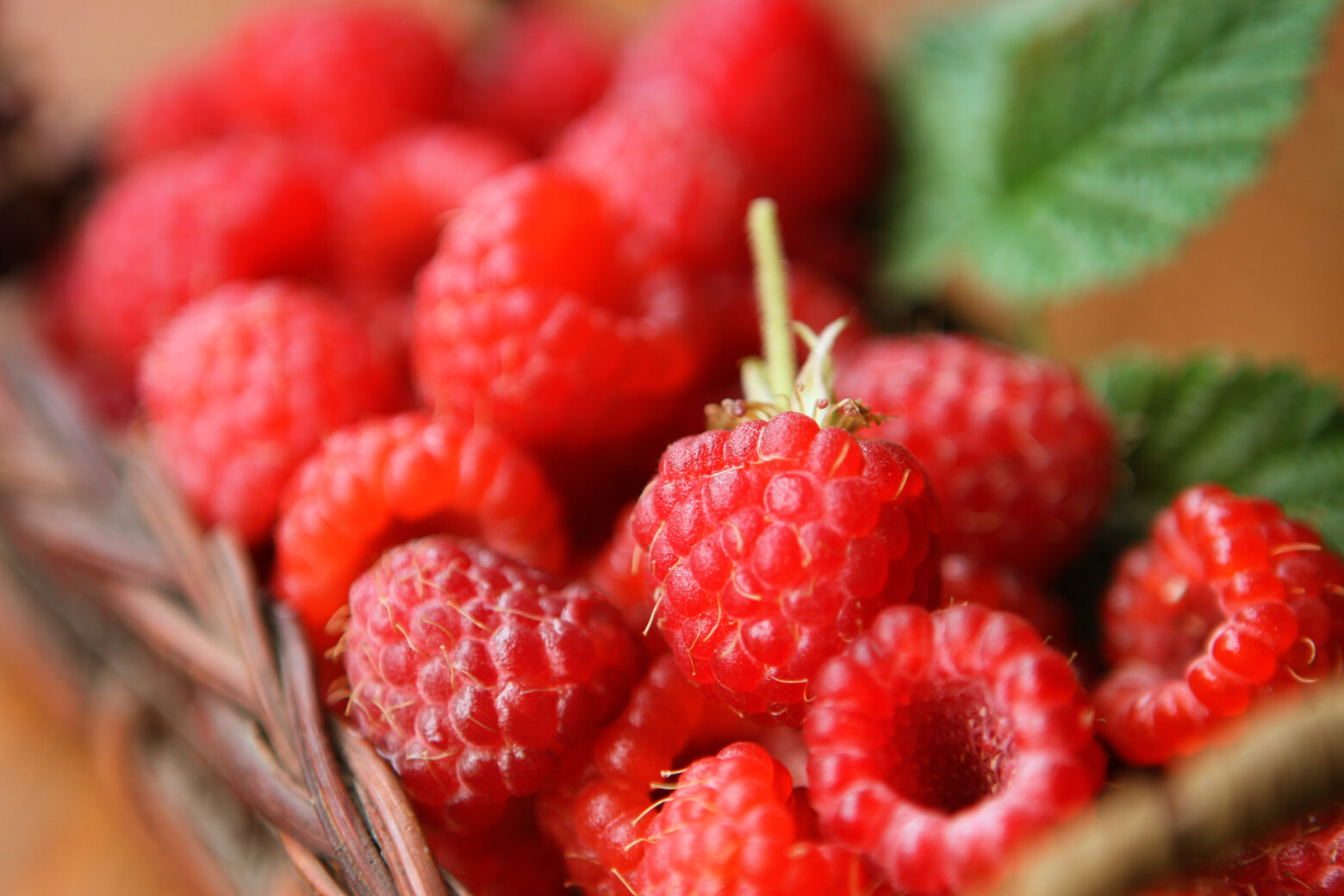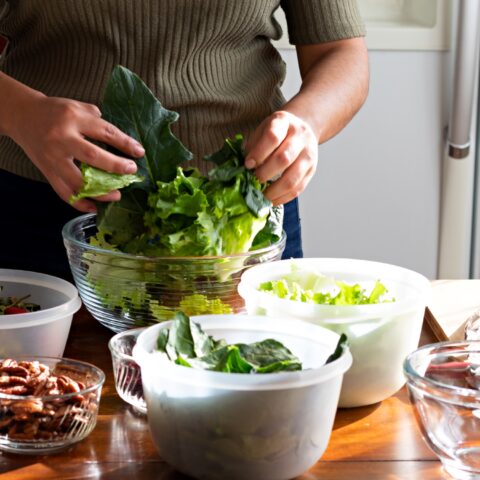Raspberry Health Benefits and Culinary Tips

Raspberries have been a favorite ready-to-eat snack for generations. They’re an excellent low-sugar, high-antioxidant treat that enhances many snacks and desserts. Here’s what you may not have known about raspberries.
What Are Raspberries?
Raspberries are small, sweet-tart berries that are members of the rose family (Rosaceae). They’re known for their delicate, hollow-structured berries and woody, thorny bushes. While typically dark red (Rubus idaeus), they’re also found in black, purple, and yellow/gold varieties. [1,2]
Wild raspberries have been eaten by humans for millennia. They are native to the northern hemisphere, including Europe, North America, and parts of Asia. The Romans are credited with first cultivating raspberries in the fourth century. [3]
Today, raspberries are cultivated worldwide, but top producers are the United States, Russia, Serbia, China, Poland, and Chile. [4]
Raspberry Health Benefits
Raspberries are high in multiple nutrients which can lower the risk of chronic disease and support overall health. Potential physiological benefits include:
- Antioxidant Support: Raspberries are rich in antioxidants, including vitamin C, anthocyanins, quercetin, and ellagic acid, which help to neutralize free radicals and protect cells from oxidative stress. [5]
- Anti-Inflammatory Properties: The aforementioned antioxidants have powerful anti-inflammatory effects, which may help reduce the risk of chronic diseases like heart disease and cancer. [6]
- Blood Sugar Support: Animal studies indicate that raspberries may help balance blood sugar levels and improve insulin sensitivity. Adding raspberries to one’s diet may help reduce fat storage, lower inflammation, and improve insulin signaling, reducing the risk of diabetes. [7,8]
- Weight Loss: The improved insulin sensitivity may also help to promote weight loss. In animal studies, raspberry polysaccharides prevented weight gain, high cholesterol, and fat accumulation. [9]
- Digestive Health: The antioxidants and fiber in raspberries (8 grams per cup) help to support a healthy microbiome and reduce gut inflammation. In animal studies, raspberry polysaccharides improved gut dysbiosis and produced protective short-chain fatty acids (SCFAs), which lower gut inflammation. They also improved the integrity of the gut lining by increasing tight junction proteins and decreasing lipopolysaccharide levels in the colon. [9,10]
- Heart Health: The high amount of fiber and antioxidant content in raspberries may also help reduce blood pressure and promote circulation, improving cardiovascular health. [11]
- Cognitive Function: The flavonoids in raspberries have been linked to improved brain function and may help protect against age-related cognitive decline. [12]
Because they’re low in total sugars and high in fiber, raspberries can serve as a naturally sweet treat that doesn’t spike blood glucose or contribute to weight gain. Their high water content also helps with hydration and satiety. [13]
How Raspberries Are Cultivated
Raspberries prefer cool summers and mild winters with a soil pH of 5.6 to 6.8. The bare-root canes are planted in early spring or late fall with a support system to keep the canes upright. [3]
A balanced fertilizer high in nitrogen helps them grow, and mulching can help suppress weeds and retain moisture. Raspberry plants need full sun for at least six hours daily for the best fruit production.
Common pests to look out for include Japanese beetles, spotted wing drosophila, and spider mites. Raspberries are also susceptible to root rot and fungus, but proper spacing (2-3 feet apart) and pruning can help to prevent these issues. [14]
The berries are ready to harvest when they’re fully colored and easily detach from their cores. They ripen quickly, so it’s possible to pick them every two or three days during peak season.
Selecting, Storing, and Preparing Raspberries
When shopping for (or picking) fresh raspberries, look for plump, bright-colored berries that are firm yet tender. Avoid any that appear mushy, discolored, or have signs of mold. Raspberries are delicate and highly perishable, so handle them with care.
Store raspberries unwashed in a breathable container lined with a paper towel to absorb excess moisture. They last two to three days in the fridge. For longer storage, spread the berries in a single layer on a baking sheet and freeze until firm. Then transfer them to an airtight container and freeze for up to six months.
To prepare raspberries, wash them first to remove any debris. Then use them in salads, smoothies, or Paleo-friendly baked goods, snacks, and other treats. Raspberries are quite versatile, and can be enjoyed fresh, freeze-dried, cooked into a sauce, or preserved as a jelly, jam, or syrup. (For Paleo-friendly versions of these condiments, use a natural, whole-food sweetener like dates.) See below for more recipe ideas.
Raspberry Blended Drinks:
Raspberry Fruit Bowls:
- Cherry Berry Medley
- Fruit Salad with Poppy Seed Dressing
- Pomegranate Smoothie Bowl
- Mixed Berries with Whipped Coconut Cream
Raspberry Snacks & Desserts:
- Raspberry-Thyme Fruit Roll-Ups
- Pomegranate Raspberry Recovery Gummies
- Dark Chocolate Raspberry Truffles
- Chocolate Dipped Raspberry Cubes
References
- Skrovankova S, Sumczynski D, Mlcek J, Jurikova T, Sochor J. Bioactive Compounds and Antioxidant Activity in Different Types of Berries. International Journal of Molecular Sciences [Internet]. 2015 Oct 16;16(10):24673–706. Available from: https://www.ncbi.nlm.nih.gov/pmc/articles/PMC4632771/
- Raspberries – Raspberry Varieties [Internet]. Raspberries.us. 2025. Available from: https://www.raspberries.us/varieties.htm
- Commercial Red Raspberry Production A Pacific Northwest Extension publication [Internet]. [cited 2025 Mar 2]. Available from: https://extension.oregonstate.edu/sites/extd8/files/documents/pnw598.pdf
- Kempler C, Hall HK, Finn CE. Raspberry. Springer eBooks. 2011 Nov 21;263–304. Available from: https://link.springer.com/chapter/10.1007/978-1-4419-0763-9_8
- Burton-Freeman BM, Sandhu AK, Edirisinghe I. Red Raspberries and Their Bioactive Polyphenols: Cardiometabolic and Neuronal Health Links. Advances in Nutrition [Internet]. 2016 Jan 1;7(1):44–65. Available from: https://www.ncbi.nlm.nih.gov/pmc/articles/PMC4717884/
- Lopez-Corona AV, Valencia-Espinosa I, González-Sánchez FA, Sánchez-López AL, Garcia-Amezquita LE, Garcia-Varela R. Antioxidant, Anti-Inflammatory and Cytotoxic Activity of Phenolic Compound Family Extracted from Raspberries (Rubus idaeus): A General Review. Antioxidants [Internet]. 2022 June 1;11(6):1192. Available from: https://www.mdpi.com/2076-3921/11/6/1192/htm
- Zhu MJ, Kang Y, Xue Y, Liang X, García MPG, Rodgers D, et al. Red raspberries suppress NLRP3 inflammasome and attenuate metabolic abnormalities in diet-induced obese mice. The Journal of Nutritional Biochemistry. 2018 Mar;53:96–103. https://pubmed.ncbi.nlm.nih.gov/29202274/
- Zhao L, Zou T, Gomez NA, Wang B, Zhu MJ, Du M. Raspberry alleviates obesity-induced inflammation and insulin resistance in skeletal muscle through activation of AMP-activated protein kinase (AMPK) α1. Nutrition & Diabetes. 2018 Jul 2;8(1). https://pubmed.ncbi.nlm.nih.gov/29961765/
- Huang Y, Hu J, Xia Q, Tang M, Wang Y, Wang G, et al. Amelioration of obesity and inflammation by polysaccharide from unripe fruits of raspberry via gut microbiota regulation. International journal of biological macromolecules [Internet]. 2024 Mar;261(Pt 2):129825. Available from: https://pubmed.ncbi.nlm.nih.gov/38309402/
- FoodData Central [Internet]. fdc.nal.usda.gov. Available from: Raspberries, raw – USDA FoodData Central Food Details. https://fdc.nal.usda.gov/food-details/2346410/nutrients
- Oudot C, Gomes AC, Nicolas V, Morgane Le Gall, Chaffey P, Broussard C, et al. CSRP3 mediates polyphenols-induced cardioprotection in hypertension. 2019 Apr 1;66:29–42. Available from: https://pubmed.ncbi.nlm.nih.gov/30703746/
- Keservani RK, Sharma AK, Kesharwani RK. Medicinal Effect of Nutraceutical Fruits for the Cognition and Brain Health. Scientifica. 2016;2016:1–10. Available from: https://pmc.ncbi.nlm.nih.gov/articles/PMC4757744/
- Jazinaki MS, Nosrati M, Chambari M, Jamialahmadi T, Sahebkar A. The Effects of Raspberry Consumption on Glycemic Control and Inflammation Markers in Adults: A Systematic Review and Meta-Analysis of Randomized Controlled Trials. Current developments in nutrition [Internet]. 2024 Mar;8(6):102161. Available from: https://pubmed.ncbi.nlm.nih.gov/38860149/
- Raspberry insect pests [Internet]. extension.umn.edu. Available from: https://extension.umn.edu/raspberry-farming/raspberry-insect-pests
Betsy Schroeder
Betsy does research and writing for a few different websites in the natural health field after taking Masters level courses in Nutrition & Functional Medicine through the University of Western States.
More About The Author




